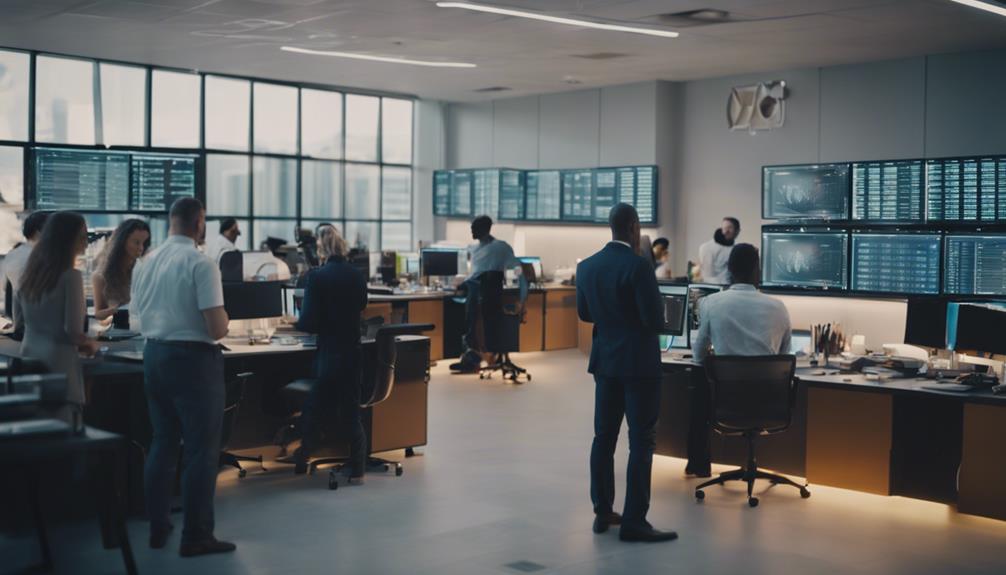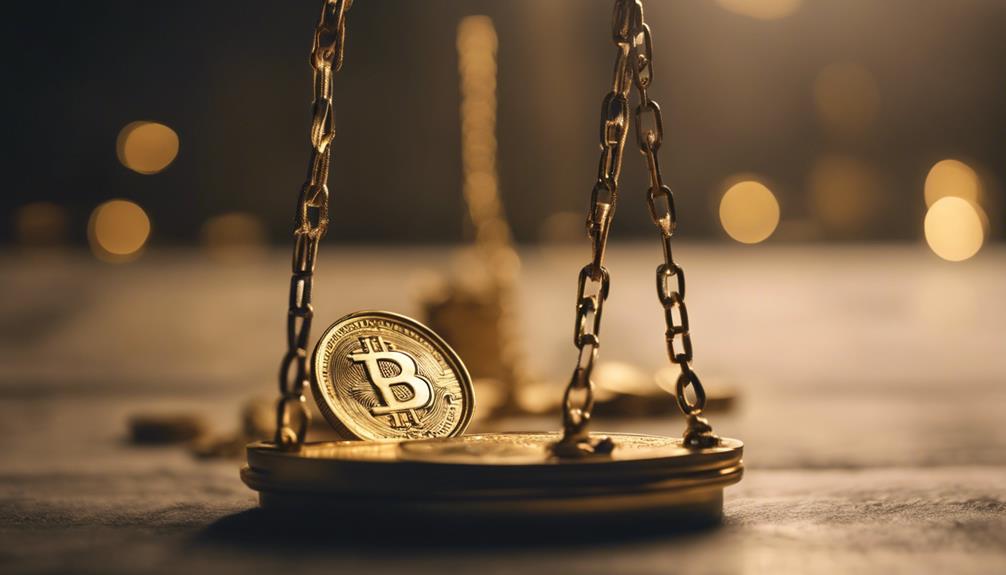Understanding the regulatory environment surrounding Bitcoin IRAs involves oversight from both the IRS and SEC, adherence to stringent securities laws, and the implementation of robust AML protocols to protect investors. The IRS classifies cryptocurrencies held in Bitcoin IRAs as property, making them subject to capital gains tax. Compliance with SEC regulations is crucial in order to protect investments. Withdrawals from traditional Bitcoin IRAs are taxed at ordinary rates, while withdrawals from Roth Bitcoin IRAs are tax-free under certain conditions. Adhering to these regulations ensures both legality and security. Working with intermediaries can help with compliance and secure management of assets. Addressing conflicts of interest is vital for protecting investors. Upholding AML requirements is essential in preventing illicit activities. The secure custody of digital assets remains a significant challenge.
Key Takeaways
- Understanding IRS and SEC oversight is crucial for compliance.
- Compliance with AML regulations is essential to prevent illicit activities.
- Collaborating with financial intermediaries aids in navigating regulatory requirements.
- Custodial solutions must comply with stringent regulations for security.
- Disclosure of conflicts of interest safeguards investors in Bitcoin IRAs.
Regulatory Landscape of Bitcoin IRAs

Bitcoin IRAs operate within a complex regulatory framework overseen by entities such as the IRS and SEC. When it comes to taxation, the IRS treats cryptocurrencies held in Bitcoin IRAs as property, which means that transactions involving Bitcoin within these accounts are subject to capital gains tax.
Compliance with securities laws falls under the scrutiny of the SEC, ensuring that Bitcoin IRAs adhere to the necessary regulations to protect investors. Withdrawals from traditional Bitcoin IRAs are typically taxed at ordinary income rates, while Roth Bitcoin IRAs offer the advantage of tax-free withdrawals during retirement, provided certain conditions are met.
It is important for individuals considering or already investing in Bitcoin IRAs to consult with tax professionals to guarantee accurate reporting and to maximize the tax benefits associated with these accounts. Navigating the regulatory landscape of Bitcoin IRAs requires a thorough understanding of both tax implications and compliance standards to ensure a secure and prosperous retirement investment strategy.
Compliance Standards for Bitcoin IRAs

Adherence to stringent regulatory requirements is paramount for ensuring the legality and security of Bitcoin IRA investments. Compliance with IRS regulations treating cryptocurrencies as property for tax purposes is essential for Bitcoin IRAs.
The oversight by the SEC plays a critical role in ensuring compliance with securities laws, particularly concerning ICOs within Bitcoin IRAs. Withdrawals from traditional Bitcoin IRAs are subject to ordinary income tax rates as outlined by the IRS, while Roth Bitcoin IRAs offer tax-free withdrawals at retirement age under specific conditions.
To navigate the complex regulatory landscape and maximize tax benefits, consulting a tax professional is highly recommended. Understanding the tax implications of Bitcoin IRAs is essential for accurate reporting and effective management of these retirement investments.
Anti-Money Laundering in Bitcoin IRAs

Anti-money laundering regulations are a critical aspect of Bitcoin IRAs, requiring stringent KYC procedures and continuous monitoring of transactions.
By adhering to AML requirements, Bitcoin IRA providers can help prevent illicit activities such as money laundering and terrorist financing within the cryptocurrency domain.
Maintaining compliance with AML regulations is essential for upholding transparency and legitimacy in the operations of Bitcoin IRAs to avoid severe penalties and legal repercussions.
AML Compliance Requirements
Stringent regulatory measures necessitate thorough customer due diligence and transaction monitoring to uphold compliance in Bitcoin IRA operations. Anti-Money Laundering (AML) compliance requirements play a vital role in preventing illicit activities within cryptocurrency transactions. These regulations mandate transparency and accountability, aiming to deter money laundering and terrorist financing.
Regulatory bodies such as FinCEN require Bitcoin IRA providers to implement robust AML programs to safeguard against financial crimes effectively. Compliance with AML laws is essential to guarantee the integrity of Bitcoin IRA transactions. Failure to adhere to AML compliance in Bitcoin IRAs can lead to severe consequences, including legal penalties and reputational damage for both providers and investors.
Upholding AML compliance is paramount for maintaining the legitimacy and security of Bitcoin IRAs in the financial landscape.
Reporting Suspicious Transactions
To maintain compliance with anti-money laundering regulations in Bitcoin IRAs, vigilance in reporting suspicious transactions serves as an essential aspect of regulatory oversight. Properly reporting these transactions is critical for upholding the integrity and security of Bitcoin IRA investments, as it helps detect and deter potential financial crimes within the cryptocurrency space. Investors and administrators must adhere to strict compliance with AML regulations to guarantee transparency and accountability in their transactions. Below is a table summarizing key points related to reporting suspicious transactions in Bitcoin IRAs:
| Reporting Suspicious Transactions in Bitcoin IRAs | Key Considerations |
|---|---|
| Importance of Reporting | Essential for AML Compliance |
| Types of Suspicious Activities | Unusual Large Transactions, Money Laundering Patterns |
| Reporting Process | Internal Procedures, Regulatory Guidelines |
| Investor Responsibility | Awareness and Diligence |
| Regulatory Impact | Safeguarding Against Financial Crimes |
Financial Intermediaries in Bitcoin IRAs

Financial intermediaries play a vital role in facilitating transactions and providing custody services within Bitcoin IRAs, ensuring investors can access the cryptocurrency market while meeting regulatory requirements. These intermediaries assist investors in navigating the complex regulatory landscape surrounding cryptocurrency investments in IRAs, offering expertise in secure storage of digital assets, trade execution, and tax reporting.
By collaborating with financial intermediaries, individuals can effectively manage their Bitcoin IRAs and stay compliant with relevant laws and regulations. Due to the intricate nature of cryptocurrency investments and the evolving regulatory environment, having knowledgeable financial intermediaries is essential for investors looking to participate in this market through their retirement accounts.
These intermediaries not only help in the day-to-day operations of Bitcoin IRAs but also provide valuable guidance on compliance matters, ensuring that investors adhere to the necessary regulatory requirements while maximizing the benefits of investing in cryptocurrencies within a retirement account.
Conflicts of Interest in Bitcoin IRAs

Exploring the landscape of Bitcoin IRAs involves understanding and addressing potential conflicts of interest that can arise when IRA providers have financial incentives influencing their investment recommendations.
In the domain of Bitcoin IRAs, conflicts of interest may manifest when providers stand to benefit financially from recommending specific investments. This scenario can lead to biased advice, as providers earning commissions or fees based on recommended assets may prioritize their own gains over the best interests of investors.
To safeguard investors, the disclosure of these potential conflicts of interest is vital. By being fully informed about any financial incentives that could impact investment recommendations, investors can make more educated decisions regarding their Bitcoin IRAs.
Regulatory bodies such as the SEC play an essential role in monitoring and regulating conflicts of interest to protect investors from unethical practices. It is imperative for investors to remain vigilant and cautious of providers who may prioritize their own financial interests over those of the IRA holders.
Addressing AML Requirements in Bitcoin IRAs

Compliance with Anti-Money Laundering (AML) regulations is a critical aspect of managing Bitcoin IRAs effectively and safeguarding against illicit financial activities. When it comes to digital assets, regulatory compliance is paramount to guarantee transparency and security within the cryptocurrency investment landscape. AML requirements for Bitcoin IRAs necessitate thorough customer identity verification procedures, continuous transaction monitoring, and the prompt reporting of any suspicious activities. By adhering to these regulations, providers of Bitcoin IRAs can mitigate the risks associated with money laundering and terrorist financing, fostering a more secure environment for investors.
Establishing robust AML programs is essential for Bitcoin IRA providers to uphold regulatory compliance and maintain trust with their clientele. Failure to meet AML requirements can result in severe consequences, such as regulatory penalties and reputational damage. Hence, it is imperative for providers to prioritize AML compliance measures to uphold the integrity of the Bitcoin IRA ecosystem and protect investors from potential financial crimes.
Custody Challenges in Bitcoin IRAs

Securely storing digital assets such as Bitcoin poses significant challenges for Bitcoin IRAs, particularly concerning custody. Custodial solutions must comply with stringent regulatory requirements to guarantee the safekeeping of investors' holdings. Third-party custodians play a crucial role in managing and securing cryptocurrencies within IRAs, navigating the intricate landscape of regulatory guidelines for custody. These regulations are designed to protect against theft, fraud, and operational risks, emphasizing the importance of compliance in maintaining the integrity and security of Bitcoin IRAs.
| Custody Challenges in Bitcoin IRAs | |
|---|---|
| Key Points | Description |
| Regulatory Compliance | Ensuring custodial solutions meet regulatory standards |
| Third-Party Custodians | Role in managing and securing digital assets |
| Protection Measures | Safeguarding against theft, fraud, and operational risks |
Frequently Asked Questions
What Is the Regulatory Landscape of Cryptocurrency?
The regulatory landscape of cryptocurrency is multifaceted, involving oversight from agencies like the SEC, IRS, and FinCEN. Compliance with regulatory requirements is essential for Bitcoin IRA providers to guarantee legal operations.
Regulations differ by jurisdiction, necessitating a deep understanding of local laws and compliance obligations. Regulatory developments influence the operation and compliance standards of Bitcoin IRAs in the dynamic crypto space.
Staying informed about regulatory changes is important for maintaining compliance in the cryptocurrency industry.
How Does the US Government Regulate Bitcoin?
The US government regulates Bitcoin through various agencies like the IRS, treating it as property for tax purposes. The SEC oversees compliance with securities laws in the crypto market, particularly monitoring ICOs.
Additionally, the CFTC regulates Bitcoin derivatives and futures trading to uphold market integrity. Adherence to these regulatory bodies is essential for operating Bitcoin IRAs in the US.
It is important to follow these guidelines to guarantee legal operation within the cryptocurrency landscape.
Is Bitcoin IRA Legitimate?
Indeed, Bitcoin IRAs are legitimate retirement accounts approved by the IRS, offering tax advantages akin to traditional IRAs. With over 170,000 users and numerous 5-star reviews, their credibility is evident.
These accounts provide exposure to leading cryptocurrencies, incorporating the benefits of decentralization and security.
What Will Happen if Bitcoin Is Regulated?
If Bitcoin becomes regulated, it could bring increased legitimacy and stability to the market. Regulation may attract more institutional investors, enhance investor protection, and reduce volatility.
Clear guidelines would help Bitcoin IRAs integrate into the traditional financial system smoothly. Compliance with regulations is vital for long-term sustainability and could pave the way for broader acceptance and adoption of Bitcoin IRAs as a legitimate investment option.
What are the Key Regulatory Considerations for Bitcoin IRAs?
When considering a Bitcoin IRA, it’s crucial to understand the best practices for Bitcoin IRA regulations. Key regulatory considerations for Bitcoin IRAs include security measures, compliance with IRS guidelines, and custody arrangements. It’s important to work with reputable custodians and stay informed about regulatory changes.
Conclusion
To sum up, understanding the regulatory landscape of Bitcoin IRAs requires a deep comprehension of:
- Compliance standards
- Anti-money laundering measures
- Financial intermediaries
- Conflicts of interest
- AML requirements
- Custody challenges.
It is vital for investors to stay informed and make sure they are following all guidelines to avoid potential risks and legal issues.
By staying compliant and addressing these challenges proactively, investors can confidently navigate the world of Bitcoin IRAs and make informed decisions for their retirement investments.









